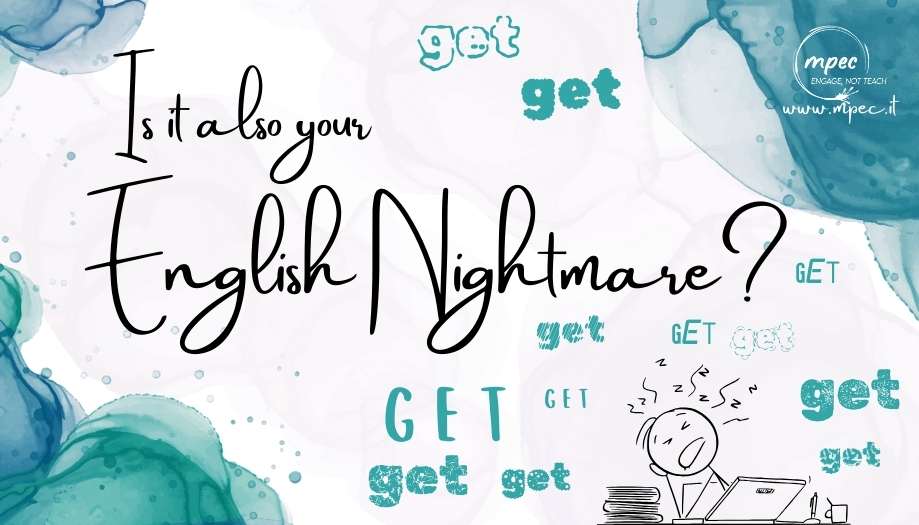Ah, “get.” C’è forse un altro verbo nella lingua inglese che può, allo stesso tempo, aprire un mondo di espressioni e suscitare un profondo senso di terrore nei cuori di chi sta imparando l’inglese? Questa apparentemente innocua parola di tre lettere è incredibilmente versatile, rendendola un pilastro delle conversazioni quotidiane e, forse, l’incubo peggiore di ogni studente. Pronti? Da adesso però, solo in inglese, ok?
Let’s first GET to know the verb ‘get’, shall we?
The Many Faces of “Get”
At its core, “get” is a chameleon. It can signify acquisition (“get a book “), arrival (“get home“), or even becoming (get tired or get engaged ). Yet, when paired with prepositions or adverbs, it transforms, becoming the backbone of countless phrasal verbs each with its unique flavour. This is where the fun begins.
The Versatility of “Get“
Consider the simple act of waking up (opening your eyes); if we leave your bed, we don’t just wake up , we “get up.” And when life throws us lemons, we don’t overcome; we get over it . Then there’s the challenge of getting along with others, where “get along” can mean anything from coexisting peacefully to forging deep friendships. The beauty of “get” lies in its ability to encapsulate complex ideas in just a few words, making conversations richer and more nuanced. However, this versatility is precisely what makes “get” so daunting for learners.
Every Student’s Worst Nightmare
We completely get (which here means: understand) the confusion when first encountering phrases like “get up to” (have an intention of doing something) “get through” (overcome or endure something) or “get down to” (motivate oneself to finally do something) Each phrase conjures a different action or meaning, and the context is king. There’s the humorous possibility of misunderstanding “get over someone” as physically jumping over them, rather than recovering from a breakup. These linguistic traps make for amusing tales but highlight the challenge of mastering “get.”
Mastering “Get”
Fear not, for all is not lost in the land of “get.” The key to conquering this verb lies in practice, exposure, and a bit of patience. Embrace the context, immerse yourself in English media, and don’t shy away from using “get” in all its forms. Remember, every mistake is a step towards mastery, and there’s no joy quite like finally “getting” it.
Conversation Club by MPEC: Let’s Talk About Researching The Holidays
Daily Routines
- What time do you usually get up during the weekdays, and how does it compare to your weekend routine?
- How long does it take you to get ready in the morning, and what are your essential steps?
- When you have a day off, how do you decide when to get going with your plans, or do you prefer to have a lazy day?
Get up – to rise from bed after sleeping
Get ready – to prepare oneself for an activity or event.
Get going – to start moving or begin a journey.
Social Interactions
- Can you describe someone new you’ve gotten along with recently? What made it easy or difficult to get along?
- How often do you get together with friends or family, and what do you like to do?
- Tell me about a time when you had to get over something challenging. What helped you through that process?
Get along – to have a good relationship.
Get together – to meet socially with others.
Get over – to recover from something (e.g., an illness, setback, or breakup).
Career & Education
- What do you think is the most important factor in getting ahead in your career?
- Have there been times when you’ve just had to get by with limited resources or knowledge? How did you manage?
- How do you motivate yourself to get on with work or studies when you’re not feeling enthusiastic?
Get ahead – to make progress, especially in your career.
Get by – to manage to live or do a particular thing using the money, knowledge, equipment, etc., that you have.
Get on with – to continue doing something, especially work.
Be Used To or GET Used To? Let’s Listen To Suzanne!
- Verbi versatili in inglese
- Come usare ‘get’ in inglese
- Guida all’apprendimento dell’inglese
- Ampliare il vocabolario inglese
- I verbi più comuni spiegati in inglese
- Club di conversazione per migliorare l’inglese
- Strategie per migliorare l’inglese parlato e scritto
- Uso pratico dei verbi inglesi nella vita quotidiana
- Semplificare le complessità della lingua inglese
#VerbiInglesi #ImparareInglese #PadroneggiareGet #VerbiComuni #ClubDiConversazione #AmantiDelleLingue #VocabolarioInglese #MasterclassVerbi #ComplessitàLinguaInglese #PercorsoLingua





